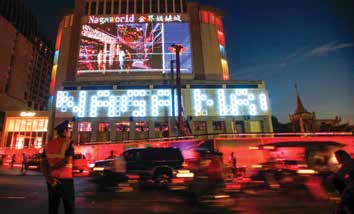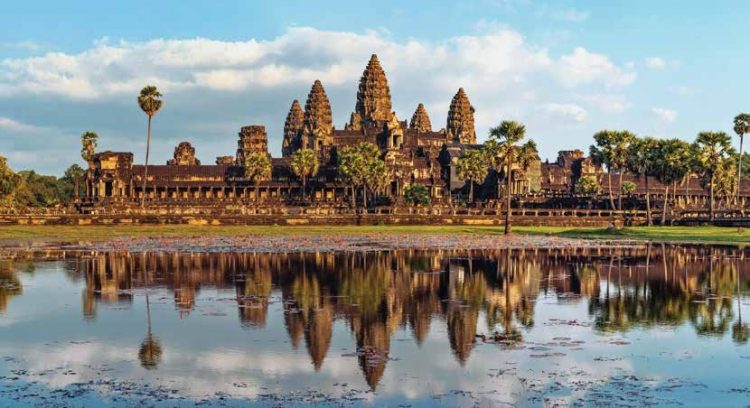In the first of a two-part series examining Vietnam and Cambodia, MdME’s Rui Pinto Proença guides us through the regulatory framework surrounding the Cambodian gaming industry.
Rui Pinto Proença is a partner at MdME, where he heads the firm’s Corporate and Gaming practice. MdME is a full service Macau law firm and a member of the MLGTS Legal Circle, an integrated alliance with renowned law firms in Portuguese speaking jurisdictions. MdME is also the Macau member firm of Lex Mundi, a world leading network of independent law firms, with in-depth experience in 100+ countries and access to more than 21,000 lawyers worldwide.
With all eyes – and business development budgets – on Japan since the Integrated Resort Promotion Bill was approved by the Diet at the end of last year, the recent developments on the Indochina peninsula have been overshadowed by the land of the rising sun. This is no surprise. With more population than Vietnam and Cambodia combined and a GDP per capita that is more than 10 times higher than both, analysts estimate that Japan – which will not prohibit local participation – could easily become the second largest gaming market in the world after Macau.
Japan, however, will not be a market for all. Licenses will be scarce (at this point, two to three seems to be the consensus) and with virtually all big players wanting a piece of the action, the going rate to build an IR has been set at a whopping US$10 billion or, in the words of one of the eager contenders, at “whatever it takes.” This is no small change and will shut out many gaming operators that, albeit suitable and financially sound, may not be able to compete at such a level.
For these companies and for the unlucky losers of the race to Japan, the Indochina peninsula may bring good enough opportunities to expand their footprint in Asia at a more affordable price tag. It is against this regional background that both the Socialist Republic of Vietnam and the Kingdom of Cambodia have been, at their own pace, laying the foundations for the development of their respective gaming industries. After a long (and, for some, painful) wait, the Government of Vietnam has issued earlier this year its Decree on Casino Business. At the same time, the Ministry of Economy and Finance (MEF) of the Royal Government of Cambodia (RGC) has released for public consultation its first draft bill of the Law on the Management of Integrated Resorts and Gaming Trade (LMGT).
With radically different gaming markets, the two countries do not have the same policy priorities and thus have taken to regulating the industry with distinct approaches. In this two-part article, The Rules of the Game will take a closer look into the recent and the prospective regulatory developments in these jurisdictions, starting with an overview of the Cambodian LMGT draft bill.
Often dubbed as an emerging market, Cambodia is by no means a newcomer to the gaming scene. Although officially illegal since the enactment of the 1996 Law on the Suppression of Gambling, the offer of casino gaming to non-nationals has been authorized by the RGC on an exceptional basis for decades. At the end of last year, Cambodia reportedly had more than 75 licensed casino venues spread throughout the country. This is probably more than all other Asian jurisdictions combined.

With the exception of Phnom Penh’s Nagaworld, operated by Hong Kong-listed NagaCorp (which holds the monopoly within a 200km radius of the capital), most casinos are located in the border towns of Poipet (bordering Thailand) and Bavet (bordering Vietnam), with some operating in the beach tourism destinations of Koh Kong and Sihanoukville. Despite the numbers, there has been no consistent strategy to govern and develop the gaming industry. The terms of investing and operating a casino have been defined on a case-by-case basis under the license granted to each of its holders.
All that will change if the LMGT is approved by the National Assembly. The draft bill – as made public by the MEF – currently stands at 13 chapters and 120 Articles. Here are some its most relevant features.
Governing Scope. The LMGT applies to the management and operation of Integrated Resorts, the Gaming Trade, Online Gaming and other forms of Gaming pursued with commercial purposes within the territory of the Kingdom of Cambodia. Gaming Trade is referred to as the operation of casino games and other forms of gaming with profit-making or commercial purposes, while Gaming is defined as the playing of casino games, online games or other games where a prize in money or money’s worth may be one based on the player’s luck or skill.
Zoning. One of the most interesting features of the LMGT is the fact that it divides the Kingdom into three gaming zones: (1) a prohibited zone; (2) a promoted zone; and (3) a favored zone. All areas that are not qualified as promoted or favored zones are, by default, prohibited. In such areas, the operation of gaming is not allowed under any circumstance or form. In a predominantly Buddhist country, the creation of gaming-free areas is particularly important to safeguard respect for sacred sites.
The promoted zones are located in the coastal provinces of Sihanouk and Koh Kong and includes its adjacent islands. These are the only areas where new IRs may be developed under the Gaming Law. Owners and operators of IRs and casinos in promoted zones will benefit from more favorable investment terms.
Favored Zones are the ones in which casinos have been approved to operate prior to the enactment of the LMGT. Casino licenses in favored zones will be grandfathered subject to complying with the provisions of the LMGT. A grace period for complying with minimum capital obligations and with the new accounting, auditing and tax obligations will be granted.

Regulator. The LMGT establishes the Integrated Resort Management and Gaming Trade Committee, referred to by the abbreviation “GMC”. The GMC is the government body responsible for defining policy, issuing regulations, approving games, collecting gaming revenue and generally supervising and enforcing the LMGT. The GMC is composed of seven members representing different ministries, including a General Secretary and a Deputy General Secretary directly appointed by the Prime Minister. Most importantly, the GMC will also be the entity that approves the development of integrated resorts and the licensing of casino operators, key personnel and equipment suppliers.
Licensing. The LMGT sets out a dual licensing structure which allows the separation of the development and ownership of the property from the operation of its casino. The development and ownership of an IR within a promoted area is subject to authorization of the GMC. Only an entity that owns land in a promoted area or is entitled to develop it may apply. During the application process the GMC will take into consideration the applicant’s financial soundness and capability to develop the property, as well as the resort’s quality, uniqueness and attractiveness.
A successful applicant will enter into an IR development agreement with the RGC. The maximum number of IRs and the minimum investment obligations will be determined by the RGC. This grants the regulator sufficient flexibility to adjust the requirements for new-to-market players according to the development of the industry from time to time. On the other hand, only an IR or casino owner or an entity that has entered into a casino operation agreement with one of the former may apply for a casino license. A casino licensee must be financially sound, experienced and suitable. A casino license to operate in a promoted zone may be issued for a period of no more than 20 years, while a license to operate in a favored zone may only be issued for a 5-year period.
Gaming Promotion. Junkets are referred to as Gaming Trade Promoters and are allowed to operate in Cambodia subject to incorporating a local entity and registering with the GMC. As in Macau, junkets are allowed to operate for a one-year period upon registration. The requirements and proceedings for registering as a gaming trade promoter are to be defined by the GMC. Gaming trade promoters are allowed to extend credit for gaming on their behalf or as an agent of a casino operator. With regulations governing junket activities becoming increasingly more stringent across Asia, a more relaxed licensing environment may help Cambodia boost its VIP business in the short term.

Participation. The LMGT will not allow Cambodian nationals to participate in gaming or to enter casinos. While this limitation may deter some potential investors from entering the market, it sets no greater restrictions than the ones that exist today. Moreover, standing in a humble 40th place out of 47 Asian countries by GDP per capita, it is doubtful that any significant investment would base its strategy in tapping the local market.
Tax. Casino operators will pay taxes based on gross gaming revenues. Although the applicable rates are yet to be announced, the LMGT indicates that these will not be the same for casinos operating within an integrated resort located in a promoted zone and for those located in a favored zone. The former will also pay different rates for revenue generated by mass market players and by VIP players. An interesting feature of the LMGT gaming tax is that the definition of gross gaming revenue allows for deduction of junket commissions.
There is still a long way to go until the LMGT is enacted. Upon public consultation, the bill must be approved by the Council of Ministries and, finally, by the National Assembly. Amendments to the text are likely to occur. However, if the final draft remains faithful to the core principles of the current proposal, Cambodia will benefit from a regulatory framework that is likely to appeal to more sophisticated investors. By reining in the existing border casinos and channeling new investments to the coastal provinces, the Kingdom may, with one stroke, phase out less desirable players and create something Asia is yet to see – a beachfront casino strip. The challenges, as I see them, will come after LMGT’s approval. The capacity of the RGC to enforce the law and the credibility amongst foreign investors of a politically charged regulator could indeed be a game of high stakes.

























